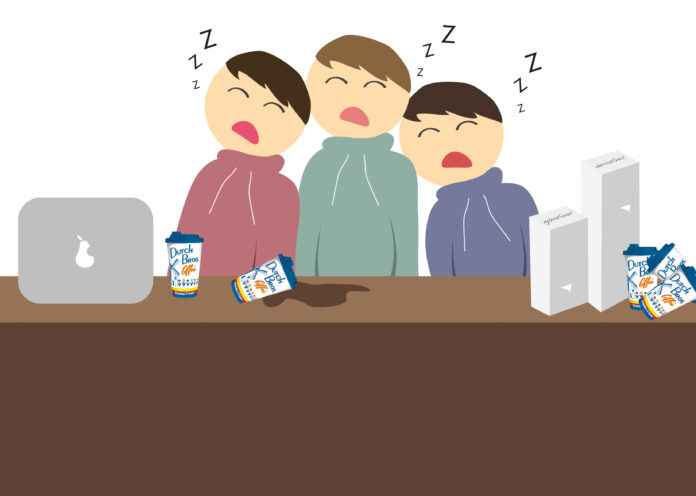Students, professors, health professionals discuss sleep deprivation in students
The lecture hall is a little too warm, and packed with students and backpacks, it starts to become cozier. The lecture, at first a stream of distinct words, fades into a lulling background noise. Your sluggishly scrawled notes swim as your eyes fail to focus, and before you know it, you’re out cold.
Staying awake in class has remained a prominent issue for many university students.
“I wish I could control myself from that sense of sluggishness,” said fourth-year East Asian Studies major Connie Luong. “But falling asleep in class is like an inevitable curse, bound to happen at least once a quarter.”
Not only does falling asleep in class result in missing out on a day’s lecture, but for most, it also means having to stay up later studying in order to compensate for missed material.
“I feel like my upper division professor definitely docked down my class participation grade for nodding off too much,” Luong said. “It’s also worrisome exiting class knowing you only paid attention half the time. What I missed might be on midterms or finals.”
With all of this mind, a valid question might be: how do students stay awake in class? According to some, one key factor is what you eat and drink, and when.
“Definitely lots of coffee,” said second-year managerial economics major Warren Kim. “Straight black and hot coffee, water even helps. Breakfast keeps you energized too.”
In order to tackle alertness in lectures, the ultimate issue is determining why students are falling asleep during class in the first place.
For many, this is simply due to a lack of sleep the night before, with most students not even realizing their frequent disregard for sleep. According to the National Sleep Foundation, adults need seven to nine hours of sleep per night. If you find yourself nodding off in class, it’s probably because your body is lacking proper rest.
In a 2013 survey of UC Davis undergraduates, 93 percent of students reported sleepiness as a problem during daytime activities. Approximately 94 percent of students felt tired or sleepy within the seven days prior to taking the survey, and 27 percent said they felt their academic performance was adversely affected by sleep.
“What I’ve noticed from the surveys is that over time, students are getting less and less sleep,” said UC Davis Student Health Center sexual and mental wellness health educator Merril Lavezzo. “The college student now isn’t the college student ten years ago. Students now also balance jobs, and so many more activities – but that’s why sleep is even more important now.”
The Student Health and Wellness Center recommends a relaxing activity prior to bedtime for students who have difficulties falling asleep, including activities such as reading or journaling. Students are advised to abstain from drinking caffeine or energy drinks, to limit the use of technology and to avoid physical exercise less than three hours before sleep.
However, instead of not being able to fall asleep, the real reason why students are falling asleep in lecture so often is due to their exceptionally late bedtimes. This can be fixed by modifying schedules to allow for maximum sleep time.
“I just don’t book morning classes,” said fifth-year economics major Willis Chan. “I try to take afternoon classes because I’m just not going to be awake in class otherwise.”
However, for most full-time university students, it just isn’t possible to get the full eight hours of sleep in a night – that’s where naps come in. The Student Health and Wellness Center recommends 20 to 30 minute late morning or early afternoon naps for optimal performance. In accordance with this, many students take short naps before class to increase concentration.
“I have early classes, and we all stay up so late,” said first-year neurobiology, physiology and behavior major Michelle Shi. “Then you go through an exhausting morning of classes, and you need some sort of pick-me-up before you can go through the next set. So I take naps because otherwise I’d be sleeping through my later classes and then there’s really no point.”
But however inviting they may seem, under no circumstance should napping replace a proper night’s sleep.
“Napping is just to help students focus,” Lavezzo said. “REM sleep usually happens deeper into the seven to nine hours of sleep. That’s when your short-term memory gets converted into long-term memory. So it’s especially important to get a full night’s rest before a midterm.”
Nonetheless, there’s only so much that the correct food and sleeping regimen can do for alertness in class. According to UC Davis chemistry professor Andreas Toupadakis, if students are paying attention to the lecture, they should not accidentally doze off.
“When students enter the lecture hall, instead of worrying about any kind of problems, instead of being on their iPhones, students should take five minutes to center themselves and focus on the class,” Toupadakis said. “Students’ minds are totally diffused on anything but the lecture and class. When you’re in class, everything else is secondary. Deal with the other things later and focus on the lecture. Why even come to a fifty minute class if you sleep for forty minutes of it?”
Toupadakis recommends students review the lecture material prior to the lecture so they understand the information and can be more engaged. He suggests taking three to five minutes before a lecture to focus only on the material.
“Think about a sports game,” Toupadakis said. “Before the game, athletes don’t walk around and chat or think about other issues. They focus themselves on the game and only the game, on winning. Isn’t class also like this? Focus on the game, on the class, and you will be successful.”
Graphic by Tiffany Choi.




